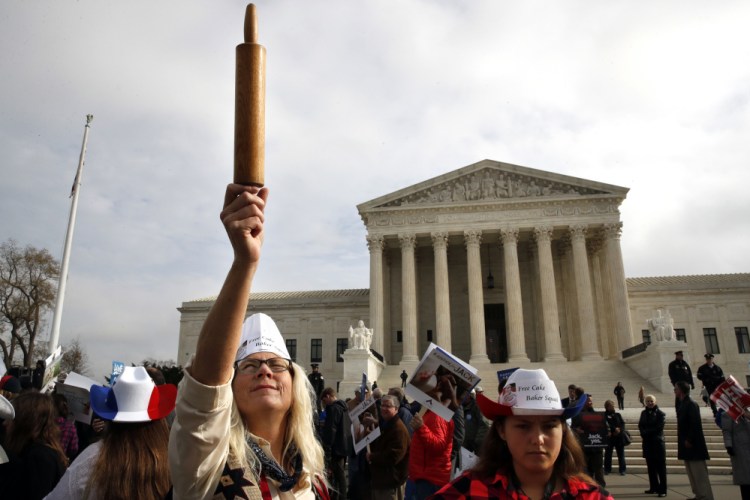The Supreme Court ruled Monday that a baker who cited his religious beliefs could refuse to make a wedding cake for a same-sex couple.
But it did not say that all religious bakers (or caterers, or florists, or DJs) could refuse to provide their services to all same-sex couples. With that still up in the air, the message for Mainers in the court’s 7-2 decision should be that not much has changed.
Maine civil rights law still protects people regardless of their sexual orientation, and businesses that are open to the public should still know that they can’t discriminate against same-sex couples, any more than they could refuse to serve people because of their race or religion.
The state should still be expected to step in, if necessary, to enforce the law and protect people’s rights, although the ruling does provide a useful reminder that both sides are entitled to due process.
The case began in 2012, when two Colorado men tried to order a cake for a party to celebrate their marriage.
When he found out the occasion, baker Jack Phillips told the men that he would refuse to bake for this occasion, because doing so would force him to participate in their wedding, interfering with his constitutional right to free exercise of religion.
Phillips said he would sell them cakes, brownies or cookies that he had already made, but that he would not bake a custom cake for them because of his religion.
He later claimed that being forced to do so under the public accommodations provision of Colorado civil rights law would be a violation of his right to free speech.
The couple filed a discrimination complaint with the Colorado Human Rights Commission. They prevailed under an administrative law judge, before the full commission and in federal court of appeals.
But when the Supreme Court reviewed the record, a majority of justices found evidence that some members of the commission had been hostile to Phillips’ religious beliefs.
In reviewing the case, one of the commissioners said, “Freedom of religion and religion has been used to justify all kinds of discrimination throughout history, whether it be slavery, (or) whether it be the holocaust … And to me it is one of the most despicable pieces of rhetoric that people can use to — to use their religion to hurt others.”
In the majority ruling Kennedy wrote: “This sentiment is inappropriate for a Commission charged with the solemn responsibility of fair and neutral enforcement of Colorado’s anti-discrimination law — a law that protects discrimination on the basis of religion as well as sexual orientation.”
Kennedy implied that a fair process could have reached the same result as the commission without violating Phillips’ religious freedom. The judge did not express an opinion on the free speech claim, although he called it “interesting.”
But Kennedy also wrote that “gay persons and gay couples cannot be treated as social outcasts or as inferior in dignity and worth.” And he said that religious objections “do not allow business owners and other actors in the economy and in society to deny protected persons equal access to goods and services under a neutral and generally applicable public accommodations law.”
Although seven justices signed on to Kennedy’s opinion, it took three different concurring opinions for them to get on board, highlighting how tenuous the compromise was.
Only Justices Clarence Thomas and Neil Gorsuch accepted the baker’s argument that his First Amendment right to free speech allowed him to withhold his services.
Gorsuch had a separate opinion, which focused on an inconsistency in the commission’s rulings. Justices Stephen Breyer and Elena Kagan accepted Kennedy’s objection to the process, but none of Phillips’ other claims.
So, without the biased comments by commissioners, the ruling could easily have gone the other way.
This ruling is most significant for what it doesn’t do. It does not challenge the constitutionality of state civil rights laws, and it does not establish a right to discriminate on religious grounds.
Until another case on this issue makes its way to the Supreme Court, nothing has changed.
Send questions/comments to the editors.



Comments are no longer available on this story